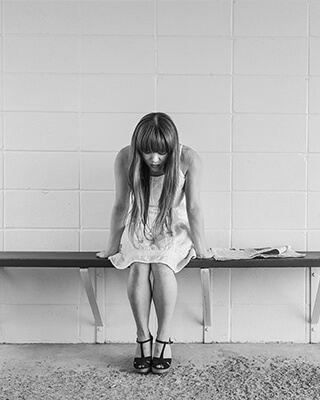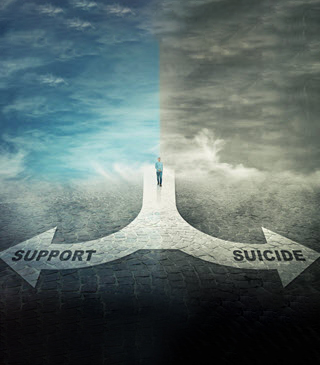
Depression and Suicide Prevention
 Depression hurts.
Depression hurts.
Whether it’s a cyclical experience of shorter periods of depression…
… or a long period of time with what’s considered more of a low-grade depression…
It doesn’t feel good.
And, if you’re in the middle of feeling depressed, you might feel uncertain of what to do next.
That’s why getting help is so important.
I don’t want this label.
That’s ok. We don’t have to call it depression. That’s just the formal way of classifying an experience a lot of people are dealing with.
Regardless of what you’re comfortable calling what you’re going through, we probably agree that it sucks and we should do whatever we can to help you feel better.
So many people have experienced and are experiencing depression.
It’s actually very common.
Even as little as two weeks of symptoms can be considered an episode of depression.
And thoughts about suicide are normal, too. According to the Center for Disease Control, millions of people every year in the United States have thoughts about wanting to die.
 I don’t think there’s any shame in feeling extremely sad or numb.
I don’t think there’s any shame in feeling extremely sad or numb.
It’s often your mind and body’s way of saying…
“I need help because I can’t get comfortable in my skin,” or
“How I feel about myself and life isn’t what I want it to be,” or
“I need to feel differently to actually enjoy life.”
It’s a lonely struggle.
Most of us are taught to deal with our issues on our own, so a lot of people suffer in silence.
Has anyone ever asked you how you’re doing, and you respond with “fine,” instead of
“Bad: I feel sad all the time, I don’t understand my purpose in life, and I sometimes find myself thinking about just not wanting to be here”?
Am I really depressed?
What does that actually look like?
Depression can show up in a number of different ways and look like any combination of…
- A lack of energy, or little to no motivation…
- Difficulty concentrating and making decisions
- Not enjoying things you used to enjoy
- Irritability
- Struggling to do daily tasks like showering and washing dishes
- Feeling numb or flat
- Low libido
- Having no appetite… or wanting to eat all the time
- Weight gain or weight loss
- Insomnia, early morning waking, or a desire to sleep all the time
- Passive suicidality (thinking of suicide or not wanting to be alive)
- Active suicidality (planning to take action to end your life)
 Treating depression can mean life or death…
Treating depression can mean life or death…
I am extremely passionate about supporting people dealing with incredibly painful emotions that can threaten their lives.
I worked with the Didi Hirsch Suicide Prevention Center as a volunteer and then as their Senior Training Coordinator. I went out into the community to help people learn how to address suicidality, and I’ve spent over 1000 hours talking with people about how to be a part of the solution.
I’ve trained high school students, mental health practitioners, and FBI Crisis Negotiators, among many others.
And, what I know for sure is that suicide scares people and keeps us from talking about it.
It needs to be talked about! People need help, they need love, they need validation and support.
I’ve never provided training to a group of people NOT touched by suicide. There are always people who have struggled with mental health issues, lost someone to suicide, or thought about wanting to die. And, that’s just the people who were vulnerable enough to speak up.
Never thought about wanting to die?
That’s great! If you’re dealing with depression and haven’t had thoughts about suicide, then we’re in the land of prevention.
We can make sure you never get to that point.
People with untreated depression are much more likely to experience thoughts of suicide during their lifetimes.
With treatment, you can avoid experiencing that level of pain.
How are you going to help me?
I’ll meet you where YOU are and we’ll work on what YOU need. Everyone is different.
You might respond to an existential exploration of meaning and purpose. Or, you might be best helped by addressing negative thoughts from a cognitive-behavioral therapy (CBT) perspective.
I’m trained in and have experience using many different strategies to treat depression and suicidality, so we’ll figure out what works for you.
 My commitment is to join you and witness your experience.
My commitment is to join you and witness your experience.
I will not leave you by yourself in this struggle.
You will not be judged here.
You will not be seen as weak or broken…
Even if you feel as if you are.
Change your course!
How you feel now doesn’t have to dictate your future.
Let’s shine a light on your pain and take down that depression.
